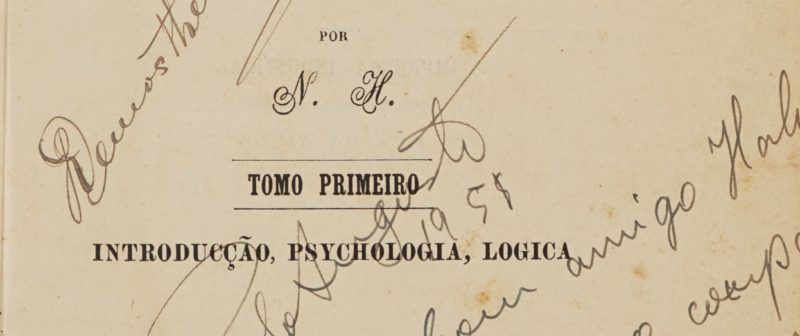Translations, from Portuguese, are automatic. If you notice any errors in the text, help us identify them, clicking here.
Subscribe to our Newsletters and receive our articles directly in your email.
During the nineteenth century, what we call the human sciences were established from a spiritualist assumption for their constitution. Meanwhile, in the natural sciences, such as Physics and Chemistry, materialism predominated. This condition is very different from what we are used to today, when the university is almost completely guided by materialistic thinking.
[originally posted on https://espirito.org.br/autonomia/livros-tratado-de-filosofia-paul-janet/]
This current of thought was known as rational spiritualism. For it was completely independent of formal religions and their dogmas. The fundamental basis was psychology, science of the soul, which had as a guideline: “The human being is an incarnate soul”.
As is explained at length in the book Autonomy, the untold story of Spiritism, Allan Kardec made psychology the conceptual basis for developing the Spiritist Doctrine. His monthly newspaper was the Spiritist Magazine, journal of psychological studies.
Rational Spiritualism was taught since 1830 at the University of Paris, also at the Ecole Normale, where teachers were trained, and also at the Lyceums, in the education of young people. For these, there were manuals, like Paul Janet's. This manual has been translated into several languages and adopted in many countries, including Brazil.
This manual is of fundamental importance to understand the conceptual basis of Kardec's studies, especially regarding spiritist morals.
The first division of the sciences, presented in the treatise on philosophy, by Paul Janet, work in two volumes, which can be downloaded here, according to the structure in force in Sorbonne University, in the 19th century, was between:
- a) The exact sciences or mathematics.
- b) The natural sciences, which study the objects of the physical world (physics, chemistry, biology, etc.).
- c) The moral sciences, which study the moral world, which comprises the actions and thoughts of the human race.
The moral sciences, in turn, were divided into four groups:
1) The philosophical sciences, divided into two classes: psychological (psychology, logic, morals, aesthetics) and metaphysical (theodicy, rational psychology, rational cosmology).
2) The historical sciences (history, archeology, epigraphy, numismatics, geography) study human events and development over time.
3) The philological sciences (philology, etymology, paleography, etc.), whose object is language and human symbolic expression.
4) The social and political sciences (politics, jurisprudence, political economy), which study the social life of human beings (JANET, 1885, p. 15-17).
The last three classes of the moral sciences (historical, philological and social) deal with moral facts or phenomena that are external to the human being, seen from the objective point of view. But, considering the human spirit “the set of the intellectual and moral faculties of man, such as they manifest themselves internally in each of us”, everything that concerns the I, an interior principle conscious of itself, is the subjective point of view, or “study of the soul itself” (JANET, 1885, p. 17). Hence a group of sciences called psychological sciences. They adopt the methodology of introspection and were a development of the scientific school started by Maine de Biran. However, to support the psychological study from a spiritual perspective, the conceptual bases of this paradigm needed to become an object of research, comprising a science of man (human spirit) and a science of first causes, or metaphysics. These are the objects of the philosophical sciences.
See more details at work Autonomy, the untold story of Spiritism.
Reading Recommendations (Books)
- Free PDFs by Kardec – https://bit.ly/3sXXBxk
- Autonomy – The Untold History of Spiritism: https://amzn.to/3PIvbyy
- Allan Kardec's Legacy: https://amzn.to/3RIn2gv
- Final point – the reunion with spiritualism with Allan Kardec: https://amzn.to/48PLaE7
- Neither Heaven nor Hell – The Laws of the Soul According to Spiritism: https://amzn.to/3F2voYO
- Genesis – Miracles and Predictions According to Spiritism (unadulterated): Free PDF or https://amzn.to/3RM91hF
- Heaven and Hell: Or divine justice according to Spiritism (unadulterated): Free PDF or https://amzn.to/3ZGrcal
- Spiritist Revolution. Allan Kardec's forgotten theory: https://amzn.to/3t7HIUH
- Mesmer. The denied science of animal magnetism: https://amzn.to/3PYc1X2
- The Book of Mediums: https://amzn.to/3PDNTHK
- The Spirits' Book: https://amzn.to/3QkcFx9
- Spiritist Magazine – complete collection: https://amzn.to/48Uxh7s
- Practical Instructions on Spiritist Manifestations: https://amzn.to/3QiR8Gc
- Spiritism in its Simplest Expression: https://amzn.to/3M6fXT5


